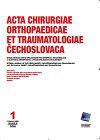[Mid-Term Results of Unicompartmental Knee Replacement Using Oxford Phase III System].
IF 0.4
4区 医学
Q4 ORTHOPEDICS
Acta chirurgiae orthopaedicae et traumatologiae Cechoslovaca
Pub Date : 2022-10-15
DOI:10.55095/achot2022/053
引用次数: 0
Abstract
PURPOSE OF THE STUDY Partial knee replacement appears to be an appropriate surgical solution of unicompartmental knee joint osteoarthritis in correctly indicated cases. The purpose of our study was to evaluate the mid-term outcomes of unicondylar knee replacement using the Oxford Phase III system in the group of patients treated by the First Department of Orthopaedic Surgery, St. Anne s University Hospital Brno. MATERIAL AND METHODS The prospective study evaluated 47 patients (in 4 patients bilaterally) after the Oxford unicompartmental knee replacement performed between 2011 and 2016. The patients were evaluated using the Knee Society Score (KSS), Oxford Knee Score (OKS) and radiological examination performed at 7.3 years after surgery on average. All the patients were operated on by the same surgeon. RESULTS Based on the questionnaires and the clinical examination, the clinical and functional status was assessed, using the Knee Society Score (KSS). The mean preoperative KSS and FS values were 59.8 and 56.5, respectively. The postoperative KSS and FS values were 91.2 and 83.4. The mean preoperative value of the Oxford Knee Score (OKS) was 27.3. Postoperatively the values reached 40.7 on average. Based on the radiological examination, the lower limb correction of axis in the frontal plane was assessed. The mean axis correction was 3.1°. The mean tibial component slope measured on lateral radiograph was 82.7°. The basic analysis of X-rays did not reveal any component malposition. The implant survival rate was calculated using the Kaplan-Meier cumulative survival curve. In our group of patients, the mean survival rate of Oxford Phase III unicondylar knee replacement at 7.3 years postoperatively is 98.0%. DISCUSSION Many studies have reported excellent results of unicondylar knee replacement and a long survival rate of over 90%. Still debated, however, are the indication criteria and also the importance of the surgeon s experience and mastery of the surgical technique. CONCLUSIONS The results of the study confirm our excellent clinical experience and the survival rate of 98% at the mean follow up of 7.3 years after surgery shows great promise for quality long-term results. Overall, crucial for the success of UKR continues to be the compliance with the indication criteria for surgery. The choice of the type of implant and, last but not least, the correct surgical technique and postoperative rehabilitation programme are also important. Key words: unicompartmental knee replacement, Oxford Phase III, osteoarthritis of the knee.[使用Oxford III期系统进行单室膝关节置换术的中期结果]。
研究目的部分膝关节置换术是治疗单室膝关节骨性关节炎的一种合适的手术方法。我们研究的目的是评估在布尔诺圣安妮大学医院第一骨科接受治疗的患者组中,使用牛津III期系统进行单髁膝关节置换术的中期结果。材料和方法该前瞻性研究评估了2011年至2016年间进行牛津单室膝关节置换术后的47名患者(其中4名患者为双侧)。使用膝关节学会评分(KSS)、牛津膝关节评分(OKS)和术后平均7.3年进行的放射学检查对患者进行评估。所有的病人都是由同一位外科医生做手术的。结果在问卷调查和临床检查的基础上,采用膝关节社会评分(KSS)对患者的临床和功能状态进行评估。术前平均KSS和FS值分别为59.8和56.5。术后KSS和FS分别为91.2和83.4。术前Oxford膝关节评分(OKS)的平均值为27.3。术后平均达到40.7。在放射学检查的基础上,评估了额平面中轴的下肢矫正。平均轴校正为3.1°。侧位X线片上测量的平均胫骨部件斜率为82.7°。X射线的基本分析没有发现任何部件错位。使用Kaplan-Meier累积生存曲线计算植入物的生存率。在我们的患者组中,Oxford III期单髁膝关节置换术后7.3年的平均生存率为98.0%。然而,仍有争议的是适应症标准,以及外科医生经验和掌握手术技术的重要性。结论该研究的结果证实了我们出色的临床经验,术后平均随访7.3年的存活率为98%,显示出高质量的长期结果的巨大前景。总的来说,UKR成功的关键仍然是符合手术适应症标准。植入物类型的选择,最后但并非最不重要的是,正确的手术技术和术后康复计划也很重要。关键词:单室膝关节置换术,牛津III期,膝关节骨性关节炎。
本文章由计算机程序翻译,如有差异,请以英文原文为准。
求助全文
约1分钟内获得全文
求助全文
来源期刊
CiteScore
0.70
自引率
25.00%
发文量
53
期刊介绍:
Editorial Board accepts for publication articles, reports from congresses, fellowships, book reviews, reports concerning activities of orthopaedic and other relating specialised societies, reports on anniversaries of outstanding personalities in orthopaedics and announcements of congresses and symposia being prepared. Articles include original papers, case reports and current concepts reviews and recently also instructional lectures.

 求助内容:
求助内容: 应助结果提醒方式:
应助结果提醒方式:


